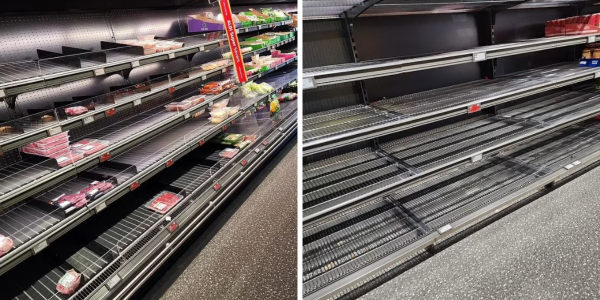Empty shelf crisis: ALDI's response to supply disruptions
By
KenAlunan
- Replies 1
A recent wave of stories regarding empty shelves in grocery stores has led to a growing number of concerned shoppers, barren aisles, and a flurry of social media buzz. But what lies behind this scene of grocery chaos?
Recently, ALDI shoppers in Western Australia were met with such a sight, prompting concerns and a flurry of social media activity as customers shared images of the barren aisles.
The photographs, particularly from a store in Geraldton, showed a stark reality: where there should have been an abundance of meat and pasta, there were only gaps.
This led to a mix of frustration and speculation among shoppers. Some voiced their dissatisfaction online, while others offered a more understanding perspective, acknowledging that ‘they can't sell stuff that hasn't been delivered’.
The root of the problem? A series of unfortunate events, including heavy rain and flooding, led to the closure of critical transport routes in March.
This disruption in transportation has had a ripple effect, affecting not only ALDI but also major supermarket chains like Coles and Woolworths, all of which have reported stock issues.
In response to the concerns, ALDI has reassured customers that the situation is being managed and that improvements should be noticeable soon.
‘There have been disruptions to some stock supply for our West Australian customers caused by a number of factors, including freight interruptions,’ a company spokeswoman stated.
A company spokeswoman said, ‘Like other retailers, we are working to deliver a return to regular stock levels as soon as possible, and customers should notice this in the coming days.’
This sentiment was echoed by Woolworths Chief Executive Brad Banducci, who mentioned that some items would remain in short supply for a bit longer, estimating at least another 10 days during the Senate committee inquiry into supermarket pricing.
‘For all of our Western Australian shoppers, there are still material issues in supply there,’ he said.
‘We’re working very hard, and I know our competitors are, to get them back into supply.’
Coles, too, has assured that the backlog of deliveries is being cleared and that stock should be arriving in WA stores shortly.
While groceries are working hard to resolve these issues, it might be worth exploring local markets or smaller grocers, which could have a more consistent supply due to their proximity to local producers.
It's also an excellent opportunity to support local businesses and discover new favourite products.
You can read about a savvy Aussie’s experience shopping at local grocers here!
 Have you been affected by the empty shelves at your local ALDI or other supermarkets? How are you coping with the stock shortages? Let us know in the comments below!
Have you been affected by the empty shelves at your local ALDI or other supermarkets? How are you coping with the stock shortages? Let us know in the comments below!
Recently, ALDI shoppers in Western Australia were met with such a sight, prompting concerns and a flurry of social media activity as customers shared images of the barren aisles.
The photographs, particularly from a store in Geraldton, showed a stark reality: where there should have been an abundance of meat and pasta, there were only gaps.
This led to a mix of frustration and speculation among shoppers. Some voiced their dissatisfaction online, while others offered a more understanding perspective, acknowledging that ‘they can't sell stuff that hasn't been delivered’.
The root of the problem? A series of unfortunate events, including heavy rain and flooding, led to the closure of critical transport routes in March.
This disruption in transportation has had a ripple effect, affecting not only ALDI but also major supermarket chains like Coles and Woolworths, all of which have reported stock issues.
In response to the concerns, ALDI has reassured customers that the situation is being managed and that improvements should be noticeable soon.
‘There have been disruptions to some stock supply for our West Australian customers caused by a number of factors, including freight interruptions,’ a company spokeswoman stated.
A company spokeswoman said, ‘Like other retailers, we are working to deliver a return to regular stock levels as soon as possible, and customers should notice this in the coming days.’
This sentiment was echoed by Woolworths Chief Executive Brad Banducci, who mentioned that some items would remain in short supply for a bit longer, estimating at least another 10 days during the Senate committee inquiry into supermarket pricing.
‘For all of our Western Australian shoppers, there are still material issues in supply there,’ he said.
‘We’re working very hard, and I know our competitors are, to get them back into supply.’
Coles, too, has assured that the backlog of deliveries is being cleared and that stock should be arriving in WA stores shortly.
While groceries are working hard to resolve these issues, it might be worth exploring local markets or smaller grocers, which could have a more consistent supply due to their proximity to local producers.
It's also an excellent opportunity to support local businesses and discover new favourite products.
You can read about a savvy Aussie’s experience shopping at local grocers here!
Key Takeaways
- ALDI Australia has acknowledged the issue of empty shelves in West Australian stores following customer complaints on social media.
- The shortage has been attributed to freight disruptions caused by extreme weather conditions, such as heavy rain and flooding.
- Both Coles and Woolworths have also experienced stock issues in WA due to the same logistical challenges.
- ALDI, Coles, and Woolworths are working to restore regular stock levels and expect improvements for customers in the coming days.








